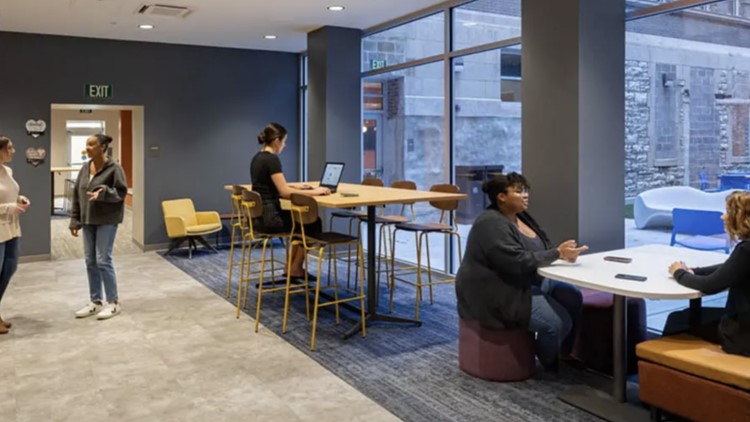ST. LOUIS — From the Delmar Divide to the Delmar DivINe - you only change one letter (and add two gratuitous capitalizations to make a point). Maybe, you also can change a mindset. Maxine Clark, the local entrepreneur and philanthropist who dreamt this up and is putting it into practice, wants to change more than mindsets.
She wants to change, obviously, the Delmar Divide - the divide between deprivation and opportunity, poverty and sustenance, Black and white, north and south in St. Louis city and county. She wants to bring us closer together - "proximity matters" - to solve our problems.
So, how is that going for her? We asked her.
The St. Louis American: I believe some St. Louis American readers have never heard of the Delmar DiviNe. What is it, and what does it offer the community?
Maxine Clark: The Delmar DivINe is a place and space that has been reimagined out of the former St. Luke’s Hospital to house nonprofit tenants in a collaborative and engaging way. The workspace also includes the Berges Family Conference Center, which holds up to 200 people for larger engagement, as well as 18 other conference rooms of varying sizes.
The Delmar DivINe has become what I hoped it would be, a gathering place for agencies and community members to meet in comfort, with technology support, and solve problems.
Included in the commercial space is the NoDe - coworking north of Delmar. Open to the public, the NoDe offers a variety of ways to use the co-working space daily, weekly or monthly. Also, part of the campus facing Delmar are our services open to the community, including a location for the St. Louis Community Credit Union, Greater Health Pharmacy, an SSM Express Clinic and an Edward Jones office. The Deli DivINe [opened] in April.
These tenants act as amenities to the other tenants and to the community. All of the retail tenants are open to the public. St. Louis Community Credit Union is already processing loans and investments in the community. The pharmacy and urgent care are filling in an important gap, as is Edward Jones.
The campus also has 150 apartments, which includes about 15% that are slated as low income. The apartments have full amenities including a swimming pool, fitness center and dog park. There are one and two bedrooms still available.
The St. Louis American: What are some of the problems being worked on there - and any evidence of solutions?
Maxine Clark: Our tenants are made up of social service agencies that work in education, health, mental health and community development. Proximity is important. We are having major “collisions” of people now working together to solve some of our issues, though we know that takes time to achieve. We want to make progress every day.
One of our tenants, Turn the Page STL, is working with Ready Readers, which is one of their partner organizations, on a major literacy improvement effort in the West End with our neighborhood group, We Collab. These are not only tenants but also part of our village to connect and act.
Another tenant, EyeThrive, which travels to school districts and libraries, is working with other health care tenants in the building to reach more children.
Blueprint4.com is working with Unleashing Potential and other tenant organizations to bring more summer camps to the West End and will host four camps at Delmar DivINe in our community space.
Greater Health Pharmacy and Wellness has partnered with SSM Health to create an Express Urgent Care clinic, which is already serving the community where there was no urgent care anywhere near. The pharmacy, led by local Black entrepreneur Marcus Howard, has forged partnerships with the City of St. Louis Health Department, the St. Louis County Health Department, Missouri Foundation For Health (MFH) and another tenant, Seed STL, to help provide healthier food options to families in need through a delivery program.
The St. Louis Community Credit Union was our first signed tenant. This majority-Black-owned credit union is a partner with BJC HealthCare and MFH, and they opened an office in our building to serve the neighborhood. They are already doing car loans, home improvement loans and small business loans in the neighborhood.
There are other partnerships brewing that come from our internal gatherings and better understanding of what each tenant can provide so we can create more equity in St. Louis faster.
The St: Louis American: The name seems to pun on 'the Delmar Divide.' Is this an effort to bridge that divide? If so, how is that going?
Maxine Clark: The name "Delmar DivINe" came from my total distaste for the word "divide." If we continue to call Delmar "the Divide," we will never make progress towards connecting our neighborhoods. I really just changed the "D" to an "N" to form the word "IN" for investment, innovation and inclusion.
At first, it was a working name, but the neighborhood began to use it in daily conversation, and so it stuck. As we developed our strategy to inform the community, the more we used "Delmar DivINe" the less people were using "the Divide." We are changing the divide day by day, and now when people talk about Delmar it is about the DivINe!
For more information, visit https://delmardivine.com.


